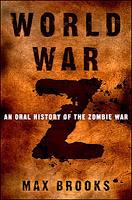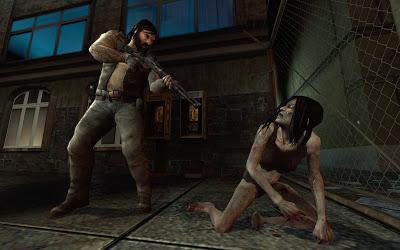
Regular readers of this blog know that one of my son's primary educational goals is preparing for the zombie apocalypse. He's talking about college and career goals too, just in case society remains intact for another five years or so. Because, you know, it's always wise to have a "Plan B."
Several things comprise his zombie survival training. It mostly seems to involve playing a lot of video games. For the good of the survival of humanity, of course.

I'm kind of fascinated with the current zombie mania. My theory is that, throughout history, people have always been terrified or fascinated by apocalyptic events. In every part of history, people have been convinced, deep down, that the end is forthcoming and theirs is one of the last generations God will bring onto this earth. In some eras, it made sense. In the middle ages, the population was being decimated by bubonic plague. It wasn't too much of a stretch to believe humanity's days were numbered.
When I was growing up, in the 70s and early 80s, I'd become accustomed to hearing that nuclear Armageddon was on our doorstep. Two superpowers, with enough combined nuclear weaponry to annihilate our planet 7 times. (After the first time, I'm guessing the rest of those weapons would be superfluous.) Both poised to flip the switch. We sort of had to rely on the wisdom -- or at least the sanity -- of our elected leaders. Always a dodgy proposition at best.
Now the Cold War is over. There is still plenty of fear in this post-9/11 world, of course. But while I grew up with buzzwords like "Nuclear Winter," my kids are coming of age in a world obsessed with ... Zombocalypse.
On the upside, my son and I can swap book recommendations. And we have awesome movies like Shaun of the Dead. It's all good.
About the Book:
World War Z isn't a conventional novel -- it's neither character driven nor plot driven. When I started perusing this book, I had my doubts. But Max Brooks (son of filmmaker Mel Brooks, I'm told) has an eloquent writing style, a sharp wit, and a wicked sense of humor. While the overall tone of the book isn't humorous, the narratives are witty, clever, and often hilarious. Brooks also has insight into human nature and a keen sense of how human beings -- and all the institutions we've created -- respond to crisis. I found this book difficult to put down.
In a post-world war world, the undead have decimated the population but have, at long last, been defeated. The narrator of World War Z is a historian, collecting stories from each stage of the crisis, from the first known infections to the aftermath. He travels the world interviewing soldiers, civilians, and other survivors.
His sources are an eclectic bunch. Including a pharmaceutical guru who marketed a bogus drug that promised protection against the zombie virus. A K-9 handler who trained dogs to help fight the undead. A filmmaker who used his gift to give hope to survivors. A young Japanese geek who spent so much time sequestered with this computer that he didn't notice the zombie apocalypse was right at his door until it was almost too late. A dude who used the zombie apocalypse as an opportunity for a bad reality T.V. show. A priest who served God by shooting infected people before they became walking corpses.
This story includes scenes of many different forms of battle. It looks at human nature and how people respond to desperate situations for which they're woefully unprepared. It offers glimpses of the political repercussions of the plague. They aren't discussed in detail -- which is undoubtedly a good thing -- but they're complex and interesting. It also explores social changes wrought by the crisis. "Blue collar workers," who have practical skills, gain power and importance in this brave new world. The formerly wealthy, "lacking even the skills to repair a cracked window," because they'd always hired someone to do "menial" work, sink to the bottom of the barrel.
"No one needs a contract reviewed or a deal brokered. What it does need is toilets fixed. And suddenly that peon is your teacher, maybe even your boss. For some, this was scarier than the living dead."(I actually think this book would be an excellent choice for a sociology course. I wonder whether anyone's tried that yet?)
The narrative voices in this book are well crafted, and I loved the author's skill with what -- in conventional sci-fi and fantasy -- would be called world-building. I found this bleak new world to be richly created and believable.
A Few More Notable Quotes:
on military interrogation “Evaluation”… that’s what happens when it’s your own side. It’s only “interrogation” when it’s the enemy.
from a CIA agent Secrecy is a vacuum and nothing fills a vacuum like paranoid speculation.
from a soldier of fortune I used my training for cash… funny thing about the army, they always promise to teach you “marketable skills,” but they never mention that, by far, there’s nothing more marketable than knowing how to kill some people while keeping others from being killed.
on providing spiritual comfort I was a religious man in a country that had long since lost its faith. Decades of communism followed by materialistic democracy had left this generation of Russians with little knowledge of, or need for, “the opium of the masses.” As a chaplain, my duties were mainly to collect letters from the condemned boys to their families, and to distribute any vodka I managed to find.
on facing a mindless, inhuman enemy which can't feel fear
The book of war, the one we’ve been writing since one ape slapped another, was completely useless in this situation. We had to write a new one from scratch.
Sure, we were unprepared, our tools, our training, everything I just talked about, all one class-A, gold-standard clusterfuck, but the weapon that really failed wasn’t something that rolled off an assembly line. It’s as old as… I don’t know, I guess as old as war. It’s fear, dude, just fear and you don’t have to be Sun freakin Tzu to know that real fighting isn’t about killing or even hurting the other guy, it’s about scaring him enough to call it a day. Break their spirit, that’s what every successful army goes for, from tribal face paint to the “blitzkrieg” to… what did we call the first round of Gulf War Two, “Shock and Awe”? Perfect name, “Shock and Awe”! But what if the enemy can’t be shocked and awed? Not just won’t, but biologically can’t!
About the Movie Adaptation:

I just watched the trailer for the film adaptation, directed by Marc Forster (Quantum of Solace, Stranger Than Fiction, Finding Neverland), slated for release June 21. As I expected, it is very different from the book. I suspect this oral history is pretty much unadaptable without significant changes. It appears they tweaked the premise quite a bit but maintained some elements of the book, especially the battle scenes. On the other hand, I suspect the wit, insightfulness, and humor that made me love this book will be lost in translation.
So I'm guessing this won't be a contender for my favorite film of the year. But it looks like good fun. Don't we want to see Brad Pitt running around the world being Bad Ass? of course we do.
And never let it be said that my family missed an opportunity for a zombie movie. It might provide some valuable survival training.
